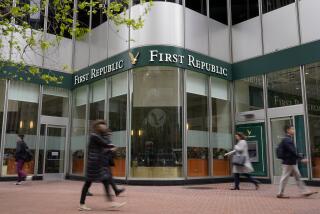After the Fall : In the Year Since Market Collapse, County Brokers Coped--and May Be Poised to Expand in Months Ahead
- Share via
It’s 5:30 a.m. and pitch black at Newport Center. Donovan Dorsey, assistant manager of the Newport Beach office of Smith Barney, Harris Upham & Co., is already glued to his Quotron machine.
Sitting in a brightly lit office, coffee mug in hand, Dorsey anxiously awaits the release of Commerce Department monthly employment figures that will determine the direction of the stock market for the day. While he waits, Dorsey punches a few keys on his Quotron to check international news reports and the overnight performance of the Tokyo stock market.
Suddenly, a voice from Smith Barney’s New York headquarters comes over the office “squawk box” with news that fewer new jobs were created during September than had been expected. The announcement cheers Dorsey: It means that the economy is not gaining strength and that inflation should remain moderate.
At 6 a.m., Dorsey turns up the squawk box and listens as research analysts in New York present their morning stock recommendations.
At 7 a.m., he summons brokers to the regular morning meeting, where he summarizes the latest news developments. Only about a dozen of the Newport Beach office’s 42 brokers show up. The talk around the room is more of sports scores than stock prices.
In fact, once the flurry of news and trading strategies relayed from the East Coast fades away, the atmosphere calms as Dorsey returns to his office to call clients.
There is a noticeable absence of incoming calls.
“A year ago, there was a buzz, an electricity in the air around here that you could feel,” Dorsey said. “That’s not here now.”
Indeed, all across Orange County, the 900 or so brokers who make a living selling stock and other securities have had to readjust their sights and adapt to life after the great stock market collapse of Oct. 19, 1987.
Twelve months later, life goes on. But the job has changed, the pace has slowed and commissions are down by about a third.
Despite the decline in business, brokerage officials said the county’s stockbroker population appears to have remained stable and may be poised to expand in the months ahead. That’s a far cry from the situation in New York, where hundreds of Wall Street professionals were laid off in the months following the crash.
On an individual level, the effect of the crash varies widely. It has made good brokers better by forcing them to be more resourceful and aggressive. It has prompted others to get out of the business entirely. For both seasoned veterans and new recruits, the collapse has meant longer working hours and substantially reduced proceeds.
According to a county brokers, those who have been in the business longer generally have had an easier time adjusting than have newcomers.
For top-producing brokers, the collapse may have been an unexpected blessing, as competing brokerage houses vied to hire them away with lucrative up-front bonuses based on their performance before October, 1987.
“We’re busier than ever before,” said Richard Zander, president of Zander Associates, a Los Angeles-based headhunting firm. “From Santa Barbara to San Diego and all points in between, managers are looking for aggressive, clean brokers.”
But for those relatively new to the business, last year’s market collapse led to lean times because their customers tend also to be new to the market.
Mark Van Mourick, a founding partner at Optivest, a Newport Beach money management firm with $35 million in assets, said: “Most of the brokers are staying with clients they’ve had for five years or longer. But the investor who came late to the game, he’s gone.”
Van Mourick had been a broker with Smith Barney for eight years before becoming a money manager.
“Times have changed, but what hasn’t changed are the BMW payments,” he said. “It’s a lot easier to add a luxury than to take one away, and a lot of young brokers feel they have to keep up a certain image.”
The sales decline has squeezed some low performers out of the market altogether. “We’ve certainly heard the stories of ex-brokers tending bar in Newport Beach,” said Katherine McInturff, a headhunter with Wall Street Recruiters in Newport Beach.
But McInturff estimated that there are roughly the same number of brokers in the business in Orange County this year as last.
“The horror stories come from the people who were shaky to begin with,” Van Mourick said. “A solid broker may be making $60,000 this year, instead of the $90,000 he made last year. It’s the guy whose salary went from $40,000 to $20,000 who’s probably gone.”
He estimated that no more than 10% of the county brokers who were selling stock a year ago have left the business since the collapse, “and half of them would have been gone anyway.”
Although the numbers of brokers appear to have remained relatively stable, there is clearly far less business to go around.
“It’s tough to break in to the business today,” said the director of one county brokerage office. “For every 30 cold calls one of my young brokers may make in an hour, 24 probably hang up on him, and the other six say no thank you.”
Several brokers said they have lost clients who cashed out of the market because of the collapse. Finding new customers to replace them often requires creative salesmanship.
“Prospecting is tougher, and there is more competition from real estate,” said Philip Northcote, a broker with Paine Webber Inc.’s 22-member Orange office.
“One of my clients who got out of the market made 30% on a $300,000 real estate investment this year. You run into that kind of problem all the time. Real estate has done extremely well.”
Of about 600 clients, less than a third are active investors in the stock market, fewer than in 1987, Northcote said.
He said Paine Webber lost about eight county brokers this year, but they have been replaced by others recruited from competing firms.
The big brokerages are putting the best face possible on the situation. Many say they are expanding staffs in Southern California to get positioned for the next bull market, which they insist is just around the corner.
“We’re very optimistic on the outlook,” said Don Goldman, manager of Merrill Lynch’s 35-member Newport Beach office. “When you wait for the market to go up before you invest, you’ve lost. We are looking to expand our operation, either by moving into larger quarters or opening up a satellite office.”
Goldman said up to 15 new brokers could be hired if Merrill Lynch finds suitable office space.
“We are training constantly,” said Robert Juneman, director of Dean Witter’s Southern California region in Los Angeles. “We now have about 180 brokers in Orange County, which is up by about 10% over last year. We’ve trained 90 brokers in Southern California in the last year. And many brokers from other firms, especially from E.F. Hutton, have joined us.”
E.F. Hutton merged with Shearson Lehman Brothers last year.
The collapse hurt Smith Barney’s business less in the county than in other parts of Southern California “because of the great numbers of people moving down here,” said Otis Healy, the firm’s western regional director, who is based in Newport Beach.
“Growth in new income and housing clearly isn’t as great in Los Angeles, and anything related to the service sector in Orange County will also grow,” Healy said. “The key to our business is diversity. We’re not looking at whether people will or won’t buy stock. We offer bonds, mutual funds, insurance policies--not just stocks.”
But in a cyclical business based in large part on customer confidence and perception of things to come, brokerage houses tend to promote the official line, even if some observers believe their optimism is unwarranted.
Market’s Built-In Spin
“There’s a positive spin built into the market,” Van Mourick said. “The whole system is geared for going up and going ahead. If Merrill Lynch came out and said stocks are going down, the whole investment world would say thank you, but see you later.”
Meanwhile, brokers acknowledge that their lives have been changed by the collapse.
“I’ve probably lost more clients this year than in any previous year,” said Cameron Karg, a broker at Crowell Weedon & Co.’s Newport Beach office. Karg said he has been in the business for 19 years.
Wednesday’s one-year anniversary has some potential investors spooked. “A year ago, everyone just assumed the Dow would hit 3,000,” said Robert Goss, a broker at Smith Barney. “Now you have people going on television warning that the Dow will break to 400. If we can just get to Oct. 19, everything should be OK.”
But some brokers who have been in the business a long time said last year’s crash, while dramatic, is not all that different from the beginning of other bear markets.
“I’ve been doing this since 1966, and this is no worse than other down cycles,” said Northcote, the Paine Webber broker. “The difference is that what triggered this downturn was the market getting overextended, and what triggered other bear markets was high interest rates and inflation.”
Different Strategies
Brokers have coped with the crash in different ways. Smith Barney’s Dorsey said he offset the drop in stock sales by trading in higher-risk commodities futures, particularly grain contracts that soared during the summer drought. Dorsey said his clients’ portfolio performance and his own personal income are off by only about 5% from last year’s levels.
That tactic isn’t the norm, though. Most brokers have been earning a living by selling interest-bearing investments such as certificates of deposit, Treasury bonds and bills and fixed-income mutual funds.
In the past, investors would buy CDs from a bank. But with less investor interest in stocks, brokers have taken to shopping around the country for small banks willing to pay higher rates.
While the commissions are not as lucrative as on stock trades and the turnover is less frequent, CD sales have enabled brokers to maintain a relationship with investors during quiet times.
Some brokers said they are doing just fine peddling good, old-fashioned stocks.
“My year has been just as good as last year, in fact even better,” said Karg at Crowell Weedon. “But I’ve had to work harder for it this year. You get lazy when times are good. Now instead of talking to one person a day, you’ve got to talk to 10 a day.”
Karg estimated that he lost about 100 of his 350 clients this year but said that he has found just as many new clients.
“A lot of brokers have lost confidence in the market and have retreated to . . . different financial products out there,” he said. “But to hang in there, you’ve got to stick with quality companies you believe in--and we’ve got those companies right here in our own back yard.”
Karg said he has been able to persuade customers to buy stock in several Orange County companies by convincing them that many local issues are undervalued.
“You buy stocks when nobody wants them,” he said. “That’s always the way it has been.”
More to Read
Inside the business of entertainment
The Wide Shot brings you news, analysis and insights on everything from streaming wars to production — and what it all means for the future.
You may occasionally receive promotional content from the Los Angeles Times.










